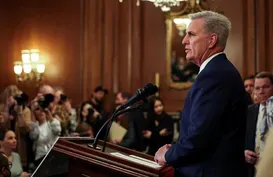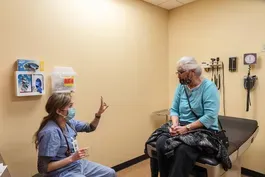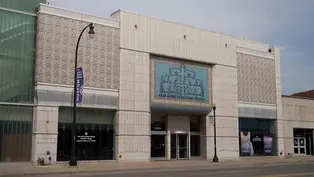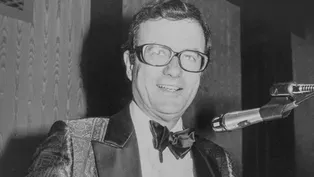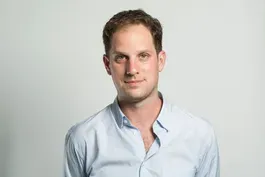
D.C. phases out COVID-era hotel housing program for homeless
Clip: 3/30/2023 | 7m 34sVideo has Closed Captions
D.C. phases out its COVID-era hotel housing program for homeless people
At the start of the pandemic, we were all urged to stay at home and avoid crowds. But for homeless people, packed shelters made COVID transmission nearly unavoidable. Many cities used federal money to house people in vacant hotels to better protect them. This year, Washington announced it would phase out its program leaving some unhoused people unsure where they will go. William Brangham reports.
Problems with Closed Captions? Closed Captioning Feedback
Problems with Closed Captions? Closed Captioning Feedback
Major corporate funding for the PBS News Hour is provided by BDO, BNSF, Consumer Cellular, American Cruise Lines, and Raymond James. Funding for the PBS NewsHour Weekend is provided by...

D.C. phases out COVID-era hotel housing program for homeless
Clip: 3/30/2023 | 7m 34sVideo has Closed Captions
At the start of the pandemic, we were all urged to stay at home and avoid crowds. But for homeless people, packed shelters made COVID transmission nearly unavoidable. Many cities used federal money to house people in vacant hotels to better protect them. This year, Washington announced it would phase out its program leaving some unhoused people unsure where they will go. William Brangham reports.
Problems with Closed Captions? Closed Captioning Feedback
How to Watch PBS News Hour
PBS News Hour is available to stream on pbs.org and the free PBS App, available on iPhone, Apple TV, Android TV, Android smartphones, Amazon Fire TV, Amazon Fire Tablet, Roku, Samsung Smart TV, and Vizio.
Providing Support for PBS.org
Learn Moreabout PBS online sponsorshipAMNA NAWAZ: At the start of the pandemic, we were all urged to stay at home and avoid crowds.
But, for homeless people, packed shelters made COVID transmission nearly unavoidable.
And so many cities, using federal COVID money,housed people in vacant hotels to better protect them.
This year, Washington, D.C., announced it would phase out its program, following others like it across the nation, leaving some unhoused people unsure where they will go next.
William Brangham has that story.
WILLIAM BRANGHAM: At McPherson Square, once the largest homeless encampment in Washington, D.C., the 70 or so people living here are losing the closest thing they have to home.
MAN: Please collect your belongings and exit the park now.
WILLIAM BRANGHAM: Daniel Kingery (ph) lived here for three years.
He says life outside was much better than inside city shelters.
DANIEL KINGERY, Washington, D.C.: I have heard people who go to the homeless shelters, and they're more violent than the streets are.
WILLIAM BRANGHAM: These sweeps,which are occurring constantly in cities across the country, come at a particularly bad time, because a successful homelessness program is now ending in D.C., following other programs like it around the country.
During the pandemic, the city brought homeless people at particular risk from COVID because of preexisting medical conditions to hotels like this one in Southwest D.C., people like Dean Eliot Clark, who is diabetic.
D.C. housed more than 2,000 people like him in these hotels.
Here, Clark gets health care, meals and privacy.
DEAN ELIOT CLARK, Washington, D.C.: You can't ask for no more.
A person that don't appreciate this, they don't appreciate nothing.
And that's sad.
That's sad.
When it's cold outside, it's warm here.
WILLIAM BRANGHAM: Tiayana Williams, who has an autoimmune disease, had been living on the streets and in the woods for over eight years when caseworkers offered her a spot in the hotel.
TIAYANA WILLIAMS, Washington, D.C.: I say you know what, what's it going to hurt me?
Let me go in this year.
WILLIAM BRANGHAM: Give it a try.
TIAYANA WILLIAMS: Yes, give it a try, and where I get to take a shower, get something to eat.
I don't have to run out my tent every morning.
So, when I got here, I did take a little break for myself.
I started resting.
DR. CATHERINE CROSLAND, Unity Health Care: I have often said that housing is health care.
I now say housing, with the appropriate supports in place, is health care.
I'm good.
How are you doing?
WILLIAM BRANGHAM: Doctor Catherine Crosland has treated residents in D.C.'s hotels since the program began.
She says one of her patients saw a huge improvement in his health after just a week inside.
DR. CATHERINE CROSLAND: He was not short of breath.
The swelling in his legs were gone.
The ulcers were healed.
He had all his medications lined up on his dresser.
And my medical intervention had not changed at all.
What had changed was that he had this stable place to care for himself.
WILLIAM BRANGHAM: Another hotel resident who asked we just call him Joe found the same effect.
With stable housing, he takes his psychiatric medicine regularly.
JOE, Washington, D.C.: Yes, it helps me keep on medication and any jobs that I hold down.
WILLIAM BRANGHAM: Having a steady place to stay?
JOE: Yes.
Yes.
WILLIAM BRANGHAM: How were you able to do that when you were living in a tent?
JOE: It was really hard.
Actually, I wasn't able to.
I wasn't able to hold down very much.
WILLIAM BRANGHAM: This hotel is one of three remaining that's still housing people in Washington, D.C.
But as federal funds disappear, and the city phases out the program, the 400 or so people that still remain face an uncertain future.
But city officials say the program, known as PEP-V, was never intended to be a permanent solution.
DENA HASAN, D.C. Department of Human Services: Continuing PEP-V as designed is ill-timed.
It was launched during a global pandemic.
WILLIAM BRANGHAM: Dena Hasan is the director of policy and program support for D.C.'s Department of Human Services.
DENA HASAN: As we are phasing out the PEP-V program, aligned with the phase-out of pandemic efforts throughout the nation, we will make sure that every PEP-V resident is linked to the services that they are eligible for.
Some of that will include permanent housing.
Some of that will not.
WILLIAM BRANGHAM: According to D.C.'s Department of Human Services, as of the end of February 60 percent of all PEP-V residents had been matched to a housing subsidy that would cover the cost of their rent.
DHS estimated around 50 people will have to return to shelters after PEP-V closes.
AMBER HARDING, Executive Director, Washington Legal Clinic for the Homeless: I'm worried that they're going to phase it out without a plan B. WILLIAM BRANGHAM: Amber Harding is the executive director at the Washington Legal Clinic for the Homeless.
AMBER HARDING: Now that the federal money for these hotel programs is lapsing in May, it's going to be a real test for local governments as to how high of a political priority it is to actually provide a program they know is saving people's lives and is improving their health in many ways.
WILLIAM BRANGHAM: For Dr. Crosland, the idea of sending her patients back to shelters is the worst outcome.
DR. CATHERINE CROSLAND: Seeing people together under one roof with end stage renal disease, metastatic cancer undergoing chemotherapy, congestive heart failure, severe COPD requiring oxygen, these are folks who should never be in a shelter, let alone an outside encampment.
And so it has really highlighted the need of a place for this vulnerable population to be while they're experiencing homelessness.
WILLIAM BRANGHAM: Researchers say this model offers a blueprint for temporary housing across the country, but a long-term solution should be the end goal.
Some point to California's Project Homekey, where local entities are provided grants to purchase vacant hotels and convert them into permanent housing for the homeless.
SAM BATKO, Urban Institute: No shelter solution, be it either congregate or noncongregate shelter, will be successful without having a housing exit strategy for the people that are staying there temporarily.
WILLIAM BRANGHAM: Sam Batko is a principal research associate at the Urban Institute.
SAM BATKO: The most important thing that a community can do is rehouse people as quickly as possible.
And so what that means is making sure that every single shelter that you have is oriented towards helping to minimize the amount of time that people spend in it and getting them into what we call permanent housing.
WILLIAM BRANGHAM: While D.C.'s program is ending, Hasan says the city will continue to improve housing options for its unhoused residents.
Do you worry that there might be some people, given that the federal money is now disappearing, that might fall through the cracks?
DENA HASAN: What we are committed to is making sure that the lessons we have learned from this crisis is implemented, is integrated into our longstanding services and supports for our residents.
WILLIAM BRANGHAM: After just over a year in the hotel, Tiayana Williams secured a subsidized apartment with the help of her caseworker.
TIAYANA WILLIAMS: Yesterday, I was with my worker.
And she took me to this apartment complex.
I love it, because it's up there by the zoo.
I want to take my grandkids to the zoo.
I signed my papers yesterday, so I'm waiting on my inspection, and then I will be on to my life.
WILLIAM BRANGHAM: It's a happy ending for her, but one that not everyone will experience.
For the "PBS NewsHour," I'm William Brangham in Washington, D.C.
Debate over raising debt ceiling heats up on Capitol Hill
Video has Closed Captions
Clip: 3/30/2023 | 6m 5s | Debate over raising debt ceiling heats up on Capitol Hill (6m 5s)
Grand jury indicts Trump in Stormy Daniels hush-money case
Video has Closed Captions
Clip: 3/30/2023 | 6m 23s | New York grand jury indicts Trump in Stormy Daniels hush-money case, lawyer says (6m 23s)
Judge rules against key ACA preventative care requirements
Video has Closed Captions
Clip: 3/30/2023 | 5m 18s | Federal judge rules against key preventative care requirements of Affordable Care Act (5m 18s)
'Nine Parts' explores lives of Iraqi women after war
Video has Closed Captions
Clip: 3/30/2023 | 7m 56s | New film 'Nine Parts' explores lives of Iraqi women after U.S. invasion (7m 56s)
Political satirist Mark Russell dies at 90
Video has Closed Captions
Clip: 3/30/2023 | 1m 7s | Political satirist and comedian Mark Russell dies at 90 (1m 7s)
Russia arrests American journalist on spying charges
Video has Closed Captions
Clip: 3/30/2023 | 12m 17s | Russia arrests American journalist Evan Gershkovich on spying charges (12m 17s)
Providing Support for PBS.org
Learn Moreabout PBS online sponsorshipSupport for PBS provided by:
Major corporate funding for the PBS News Hour is provided by BDO, BNSF, Consumer Cellular, American Cruise Lines, and Raymond James. Funding for the PBS NewsHour Weekend is provided by...
